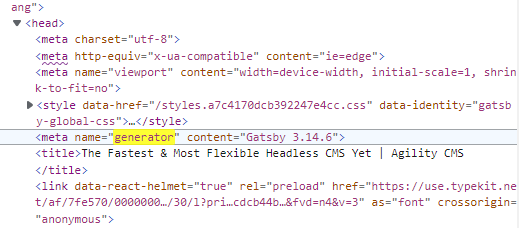How to tell what CMS a website uses


Have you ever visited a website and wondered whether it was custom-built or with a popular content management system (CMS)? If you work in digital marketing, website development, search engine optimization, or any of these fields, you may ask yourself this question multiple times. Therefore, selecting an appropriate content management system for your website could be of the utmost importance. You must choose the most effective CMS from the options currently on the market.
What is CMS?
"Content Management Systems" (CMS) refers to software that allows the webmaster or admin to handle the data quickly and efficiently. Plus, it enables several participants to develop, edit, and publish content simultaneously. It allows the administrator to regulate the appearance, website functioning, and architecture of the pages or material on the website.
However, CMS not only makes it easier for web admins to manage their websites, but it is also an essential factor in determining whether or not a website is successful. Comparable to a website, a content management system (CMS) will often store information in a database and present it using a presentation layer based on a collection of templates.
When a company publishes its online pages through a content management system (CMS), it reduces the amount of work by front-end developers to update the website, making the process quicker and simpler.
How do we detect what CMS the website is using?
There are endless considerations that need attention before an organization or an individual chooses a CMS. You should look for crucial elements like a user-friendly editor interface and advanced interactive functionalities.
We have compiled a list of some online services and methods that can be used to detect the content management system (CMS) of any website. Let's get started!
Tool and Services
WebDataStats
WebDataStats is an excellent tool for figuring out the content management system (CMS) used by a website. This software offers a reliable service that can identify databases of site domains organized by CMS. Additionally, it enables the user to view the migration history of CMS for specific domain names. They do this every month to provide the most precise and granular results possible using the service's CMS database. Enter the website address you want to detect, and click the button.
CMSDetect
The CMSDetect utility is a highly user-friendly tool. Enter the URL of the website you want to find out what content management system (CMS) it uses in the input area. You will have access to all of the information regarding the CMS or website builder that a website operates in a matter of seconds.
WhatCMS
WhatCMS is a quick and reliable web-based service tool that can determine a website's content management system (CMS) in seconds. This tool offers a free application programming interface (API) and provides information about the methods utilized to identify a website's CMS. In the input field, type the website URL you want to analyze, and click the detect CMS button to get started.
CMSmap
CMSmap is an open-source content management system (CMS) scanner created in Python. Its purpose is to automate locating security flaws and evaluating vulnerabilities in the most popular CMSs. The content management systems (CMSs) that CMSmap presently supports include WordPress, Joomla, Drupal, and Moodle.
The primary purpose of this tool is to consolidate, within a single tool, the common vulnerabilities found across a wide variety of CMS types. Please keep in mind that we are still in the beginning stages of development for this project. As a direct consequence, you can find some errors and flaws. It is strongly recommended that you do so at your peril.
SiteAnalyzer
SiteAnalyzer is a web-based service that provides a rapid method for determining the content management system (CMS). Enter the target domain names into the input fields and click the "detect CMS" button to discover the website's content management system. A domain search can be performed in bulk using this free tool. In addition, this website offers a variety of other devices, such as a domain extractor, whois checker, subdomain detector, SSL tester, and more.
Other Methods
CMS detection through Page Source Code
A dependable and straightforward strategy for determining the platform used on a website is to look at the HTML code of the page as well as the generator Meta tag. You can accomplish it in one of two ways, as follows:
- Navigate to the website that you wish to investigate.
- To view the page code, use the Ctrl+U.
- Locate the tag on the HTML page, beginning with the prefix Meta name "generator" content=.
- After the term "content," you will see the engine's name enclosed in quotation marks. Sometimes this shows the SSG, not CMS, as seen below.

File paths
When looking at the source code, it is not always easy to tell what Content Management System the website is based on. It can be deleted at any point throughout the development process or if the website is produced in-house. On the other hand, the content management system can be recognized by the normal folders and their organization within the code, specifically in the lines that show the location of the js files.
Admin login URL
A website's content management system (CMS) can be identified by examining the URL that links to the website's administration panel. If adding /wp-admin/ to the end of a domain name in the address bar took you to a page with a login and password entry window, this would be an example of WordPress being used.
Alternate possibilities and instructions for accessing the admin panel:
- site_name/wp-admin/ - WordPress;
- site_name/administrator/ - Joomla;
- site_name/admin/ - OpenCart;
- site_name/user/ - Drupal.

About the Author
Harmonie is the Senior Marketing Manager at Agility CMS
View Related Resources

The Drawbacks of Drupal and WordPress as a CMS

Setting Up CMS Integrations With APIs

